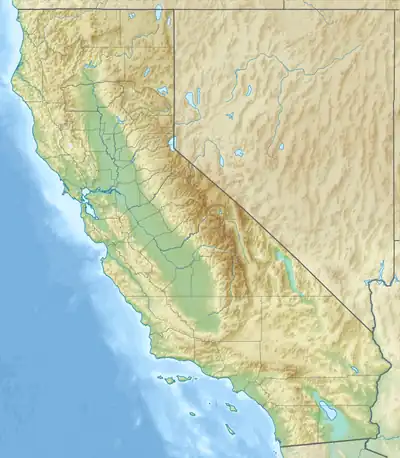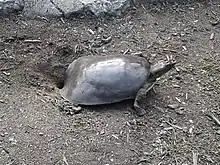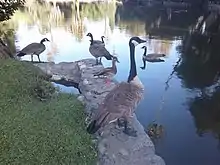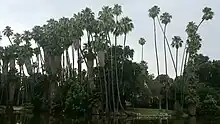Baldwin Lake (Los Angeles County, California)
Baldwin Lake is a sag pond in the Los Angeles County Arboretum and Botanic Garden, which is in the San Gabriel Valley of Southern California, south of the San Gabriel Mountains. The pond, arboretum, and botanic garden are all within the city of Arcadia.[3][4]
| Baldwin Lake | |
|---|---|
 Looking north across Baldwin Lake from near the Queen Anne Cottage at the Los Angeles County Arboretum and Botanic Garden. California native fan palm trees (Washingtonia filifera) and Mexican fan palm trees (Washingtonia robusta) line the north shore.[1] | |
 Baldwin Lake  Baldwin Lake | |
| Location | Arcadia, California |
| Coordinates | 34°08′31″N 118°03′15″W[2] |
| Type | Sag pond |
| Primary inflows | |
| Primary outflows | Aquifer recharge |
| Basin countries | United States |
| Average depth | 2 feet (0.61 m) |
| Max. depth | 30 inches (760 mm) formerly 18 feet (5.5 m) |
The pond is fed by stormwater[5] and natural springs; water flows out of the pond to the aquifer at Raymond Fault, and on to the Rio Hondo. Baldwin Lake is part of the Los Angeles River watershed.
The area of the pond is about 4 acres (1.6 ha).[4] Silt and pollutants embedded in the pond by surface runoff have reduced its depth from about 12 feet (3.7 m) to 30 inches (760 mm).[4][6]
History
For hundreds of years before the Spanish colonization of Alta California displaced them in the late 18th century, Tongva people lived near the pond in a settlement called Alyeupkigna.[7] The Spanish forced the Tongva to move to a reduction at the Mission San Gabriel Arcángel. At the site of the Tongva settlement, the Spanish established Alyeupkigna Rancheria in 1800, as an agricultural outpost of the mission.[7]
The Hugo Reid Adobe was built by Scottish−Mexican Hugo Reid on the shore of the pond in 1840.[8] Reid received the full Mexican land grant for Rancho Santa Anita in 1845, with included 'Baldwin Lake' and numerous other artesian sag ponds and springs within its 3 square leagues (13,319 acres).[7]
Elias Jackson "Lucky" Baldwin purchased Rancho Santa Anita in 1875. Baldwin Lake served as a holding reservoir for ranch irrigation projects. It was dredged and deepened, perhaps by 12–15 feet (3.7–4.6 m), by Baldwin in the late 1880s, and a retaining wall capped by granite boulders was built around the shoreline.
Baldwin built the elaborate Coach Barn near the pond in 1879, and the Queen Anne style 'Baldwin's Belvedere' or Santa Anita Ranch Guest Cottage on a peninsula surrounded by the waters in 1885−1886.[8] The Queen Anne Cottage and Coach Barn are listed on the National Register of Historic Places and California Historical Landmarks.[8] The Reid-Baldwin Adobe, remodeled and enlarged by Lucky Baldwin into his main ranch residence, is a California Historical Landmark.[8]
In 1947 the state and county acquired the land to create an arboretum around the pond and historic Baldwin structures.[7]
Wildlife
Baldwin Lake is the home for many different forms of wildlife including numerous ducks, Canada geese and turtles. There are also occasional egrets and great blue herons.



Pollution
The Save Baldwin Lake project is currently accessing how to address accumulated sediments, collapsing shorelines, reduced water depth, Raymond aquifer recharging, and the threatened aquatic ecosystems of Baldwin Lake and adjacent Tule Pond.[9][10]
A preliminary study identified several factors that negatively impact Baldwin Lake.[11] Since the early 1950s, the Lake has functioned as a collection basis for 155 acres (63 ha) of urban watershed to the north. The runoff carrying petrochemicals and other contaminants into the pond, combined with ongoing siltation, has degraded its aquatic ecosystems.[12] The pond was originally 15–8 feet (4.6–2.4 m) deep, but now has an average depth of 24 inches (61 cm).
The Arboretum began fundraising for an engineering study to determine the best approaches to restoring Baldwin Lake and Tule Pond.[13]
See also
- Lakes of Los Angeles County, California
- Arcadia, California topics
- Baldwin Avenue Railway Station
- National Register of Historic Places listings in Los Angeles County, California
References
- Matt Ritter, A Californian's Guide to the Trees Among Us, 2011, Heyday, Berkeley, ISBN 978-1-59714-147-5
- "Baldwin Lake". Geographic Names Information System. United States Geological Survey, United States Department of the Interior.
- Price, Morton R. (2006). "Recharge and water quality of Baldwin Lake at the Los Angeles County Arboretum & Botanic Garden, Arcadia, California". AEG News. Association of Environmental & Engineering Geologists. 49: 109 – via Google Books.
- Scauzillo, Steve (December 24, 2014). "L.A. County, Lucky Baldwin's relatives push for restoration of Baldwin Lake at arboretum in Arcadia". San Gabriel Valley Tribune. Retrieved June 19, 2017.
- "Arboretum works to clean up Baldwin Lake storm water pollution". ABC7.com. KABC-TV. November 21, 2014. Retrieved June 19, 2017.
- Rabe, John (August 24, 2016). "Bringing back the Arboretum's sludge-filled Baldwin Lake". scpr.org. KPCC. Retrieved June 19, 2017.
- "History of the Los Angeles County Arboretum and Botanic Garden § Baldwin Lake: Its Origins and History". Arboretum.org. Los Angeles County Arboretum and Botanic Garden. Archived from the original on October 26, 2017. Retrieved June 18, 2017.
- "Historic structures of the Los Angeles County Arboretum and Botanic Garden". Arboretum.org. Los Angeles County Arboretum and Botanic Garden. Archived from the original on June 20, 2017. Retrieved June 18, 2017.
- Arboretum.org: Save Baldwin Lake Project website. accessed June 2017.
- Arboretum.org: Save Baldwin Lake goals and objectives
- KPCC .org: "Bringing back the Arboretum's sludge-filled Baldwin Lake" (aired 24 July 2016)
- Arboretum.org: Save Baldwin Lake project causes & needs
- "Save Baldwin Lake FAQs". Arboretum.org. Retrieved June 18, 2017.